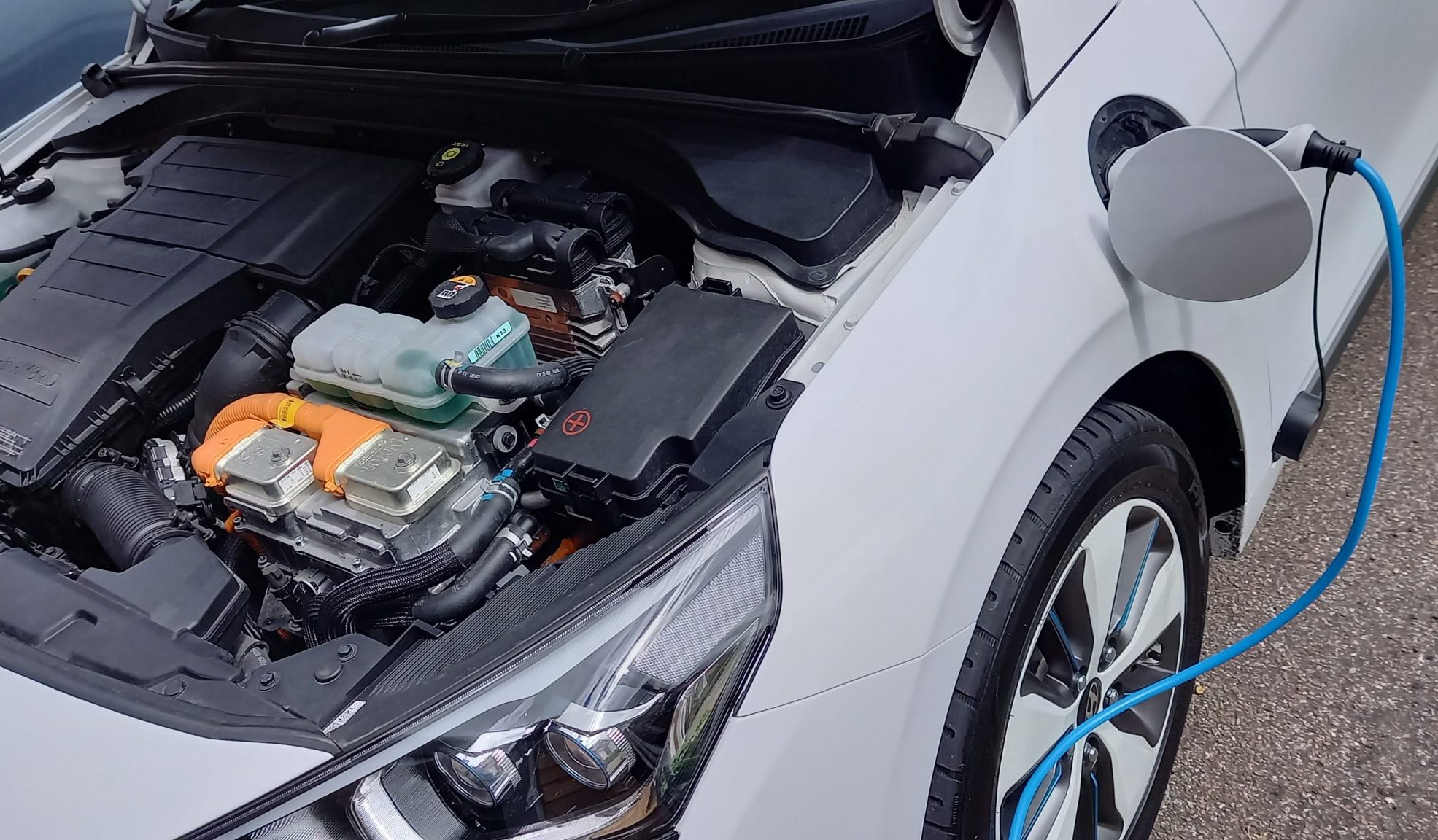Date of post: June 2023 (updated 04th November 2023)
Imagine being able to achieve over 200 miles per gallon. Sounds impossible, unrealistic or even ridiculous maybe? Well, believe it or not it’s actually very feasible. In fact, the average electric vehicle is easily able to achieve a so-called Miles Per Gallon equivalent (abbreviated MPGe), well in excess of 150 MPG.
But how to make the comparison? Much has been written about electric vehicle short driving ranges and long charging times. Whilst valid, these arguments tend to miss the point when it comes to understanding how much more efficiently an electric vehicle uses the energy stored in its high voltage battery compared to how the internal combustion engine vehicle uses the fuel in its tank.
Since buying a Hyundai Ioniq PHEV in May 2022, my motoring costs have dropped significantly. Charging the Ioniq’s high voltage battery at home is not expensive and a full battery charge can be made to last several weeks around town by adapting my driving style (and no, that does not mean having to ‘drive it like a milk float’).
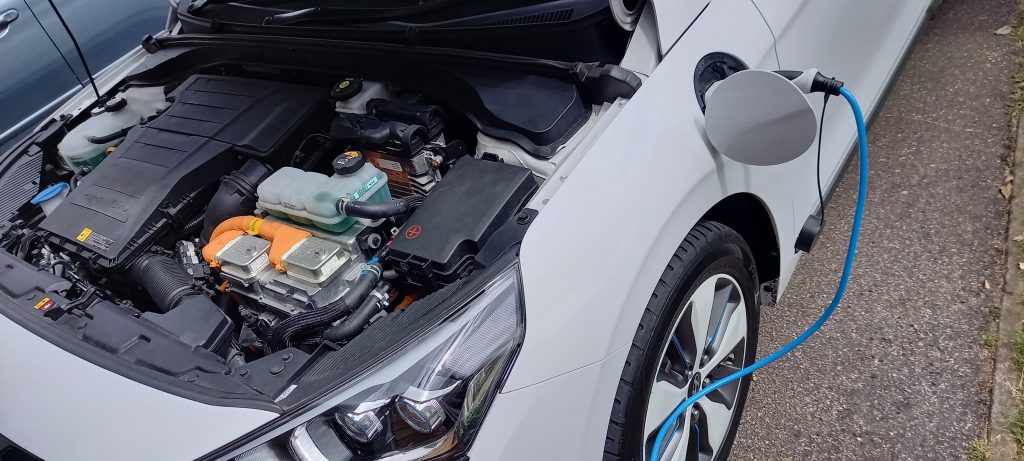
As regards petrol, the vehicle consumes on average less than 30 litres per month. It takes around 39 litres to fill the fuel tank. The total combined driving range with a full tank of fuel and a fully charged battery is over 600 miles as shown on the vehicle’s information display.
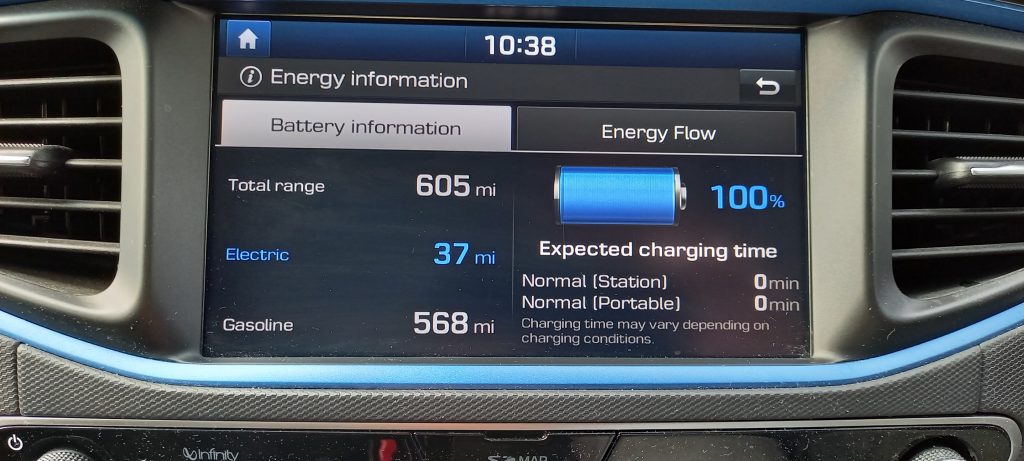
On longer motorway journeys, the car’s intelligent control strategies switch between hybrid and EV mode to give smooth pure electric high speed driving whilst also replenishing the high voltage battery’s state of charge when the vehicle periodically switches back into hybrid mode. So by the end of the journey, the high voltage battery’s state of charge is close to what it was at the start.
The combination of pure electric and hybrid driving gives an average fuel consumption return in excess of 65 miles per gallon and sometimes over 70 MPG.
Owning an electric vehicle has been a very interesting driving experience.
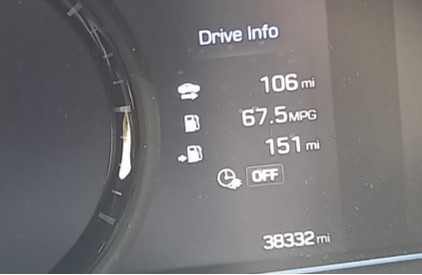
Apart from anything else, driving an EV is exciting – the average electric vehicle easily out performs its petrol or diesel powered counterpart. Though still a petrol head, I have become an EV convert and enthusiast.
However, since buying the Ioniq, I have been monitoring the real time running costs and energy efficiency of driving an electric vehicle. Like many EV motorists, I am keen to compare the car’s energy efficiency with the fuel economy of a petrol only powered vehicle.
But how can you assess and compare the energy efficiency of an electric vehicle?
To answer that question, it is first necessary to understand the relationship between the energy unit rating of the high voltage battery that drives an electric vehicle and the miles of driving range achievable per unit of that energy. Then compare that to the equivalent energy rating of a gallon of petrol and it is possible to start making a sensible comparison.
So here are the findings of some research I carried out. It’s not rocket science – just a few simple calculations. But as EV technologies continue to evolve, the new MPG is miles per kWh and it shows how much more energy efficient electric vehicles are compared to petrol and diesel powered vehicles.
MPG versus miles per kWh
An electric / hybrid electric vehicle’s EV driving range (in miles or kilometres) is largely determined by the capacity of its high voltage battery.
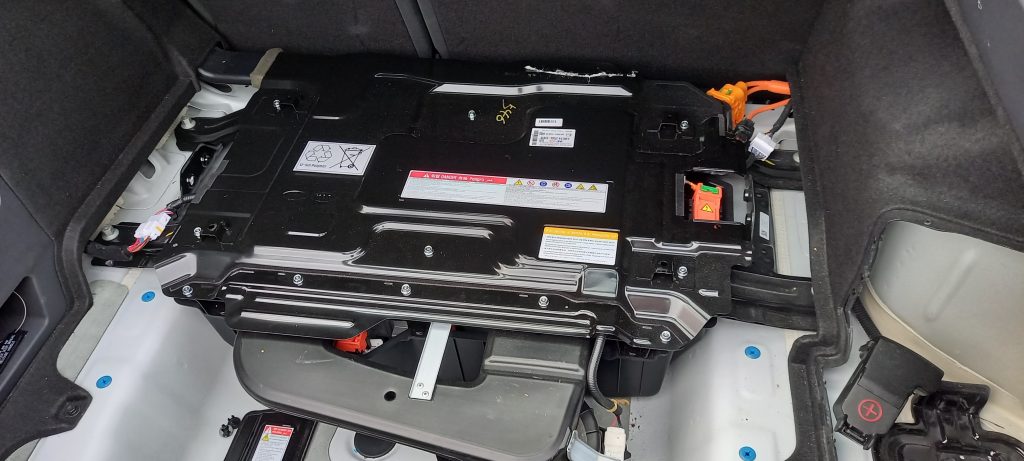
However, its actual driving range and in particular its energy efficiency are influenced by a number of other factors which include:
i) Vehicle speed
Higher road speeds consume more of the battery’s available energy.
ii) Driving style
Smooth acceleration, regenerative braking during deceleration and whilst descending
hills and coasting will use the battery’s available energy more economically.
iii) Terrain topography
Driving up and down hills, along winding roads and around town etc. uses energy less
efficiently than driving at a steady speed along a flat straight road.
iv) Weather conditions
Extreme hot and especially cold temperatures and climates affect the battery’s
electro-chemistry causing a drop in battery performance.
v) Battery condition
As the battery ages, it’s cell materials naturally degrade. As a result, its state of health
gradually drops which reduces the vehicle’s driving range.
Items i) to iv) above are broadly the same factors that influence the real time
driving range of a petrol or diesel vehicle.
In principle, the larger the battery capacity, the greater the electric vehicle’s driving range just as a larger fuel tank gives a greater driving range for a petrol or diesel vehicle. Fuel economy of petrol and diesel vehicles is measured in miles per gallon or litres per 100km of fuel consumed.
Misconceptions – range anxiety
When comparing electric vehicles with petrol and diesel powered cars, many people only look at the EV’s total driving range per full battery charge.
Whilst this is an important factor – driving range per full battery charge has historically been lower than the range obtained from a full tank of petrol or diesel – it does not really reflect the vehicle’s energy consumption efficiency when comparing with the miles per gallon of petrol and diesel vehicles.
Also, whilst some of the latest electric vehicles in 2023 can now achieve driving ranges well in excess of 300 miles from a full battery charge, many motorists are still put off buying an electric vehicle because it’s driving range is still lower.
There is also so-called ‘range anxiety’ – the fear of running out of electric driving range and knowing the location of charging stations on any one journey. However, what is really required is a different way of looking at the electric vehicle’s energy efficiency.
To really appreciate what electric and hybrid electric vehicles can deliver, we need to have a method for comparing the energy efficiency of electric vehicles with miles per gallon. To do this a different measurement unit and its equivalent value per litre or gallon of fuel is required. That unit is the kilowatt-hour.
Miles per kilowatt – hour (kWh)
Electric vehicle high voltage batteries are rated in kilowatts per hour, abbreviated kWh, also
referred to as kilowatt – hour.
The kWh is the unit of measurement of electrical energy. It represents how much energy is used by an appliance that produces 1kW of power for one hour.
In an electric vehicle, the kWh of the battery equates to the amount of electrical energy it can supply to drive the vehicle down the road.
Electric vehicles are rated according to the number of miles they can drive
per kilowatt – hour (kWh) of battery energy consumed.
MPGe (miles per gallon equivalent)
The following chart (compiled from research I carried in July 2022) shows approximate miles of driving range per kWh for a typical modern electric / hybrid vehicle and the Miles Per Gallon equivalent (MPGe).
| Miles / kWh | kWh / 100km (62 miles) | MPGe (equivalent) | |
| Average | 3.1 – 3.5 | 18 – 20 | 126 – 140 |
| Good | 3.9 – 4.4 | 14 – 16 | 157 – 180 |
| Excellent | 5+ | 12 or less | 210+ |
The central column shows the approximate number of kWh consumed per 100km (62 miles) of driving range. For this comparison, the lower the value, the better.
Overall, the chart shows that the electric vehicle is significantly more energy efficient than its petrol and diesel powered counterparts. Note however the following points:
i) Few electric vehicles currently available at the time of researching this chart (July 2022) can routinely achieve 5 miles or more per kWh. By now (November 2023), this figure is probably much higher.
ii) An average value for most vehicles at this time is around 3.9 – 4.4 miles per kWh.
kWh of battery output is the electric vehicle’s equivalent of miles per gallon.
MPGe stands for Miles Per Gallon equivalent.
Petrol / electric energy equivalent
One litre of petrol contains approximately the equivalent of 8.9kWh of electrical energy. One UK gallon of petrol comprises approximately 4.54 litres of fuel and contains the approximate energy equivalent of 43.95kWh of electrical energy. With this in mind, let us look at an example comparison.
Example comparison: kWh / MPGe
If an electric vehicle can achieve 4 miles per kWh of energy consumed, it should be able to travel 175.8 miles on 43.95kWh of energy (i.e. the equivalent of one gallon of fuel).
The vehicle is theoretically able to achieve 175.8 miles per gallon equivalent (MPGe). The most important reason for the difference in energy consumption between petrol / diesel and electric vehicles is the efficiency with which they convert stored energy into useable energy to propel the vehicle down the road.
An electric vehicle is around 85 – 95% energy efficient
A petrol powered vehicle is only about 18% – 25% energy efficient
The main reason for the lower energy efficiency of the internal combusting engine is due to the way it converts the fuel into useable energy. Fuel is burnt in the engine which creates heat energy to drive the engine. The problem is that a very high percentage of this heat energy is wasted through heat loss to the exhaust and surrounding atmosphere.
Most of the electrical energy consumed by the electric vehicle is used to drive the vehicle down the road. Less heat is produced and far less heat is wasted.
So how can we compare an electric vehicle with its petrol and diesel counterpart?
Here’s a realistic example driving range per kWh: Hyundai Ioniq PHEV
The Hyundai Ioniq PHEV has an 8.9 kWh lithium-ion high voltage battery. The Ioniq’s advertised range is up to 39 miles from a full battery charge when driven in electric only mode.
The image below shows the vehicle’s high voltage battery’s state of charge and actual available range on the vehicle’s energy information display located in the centre of the dashboard.
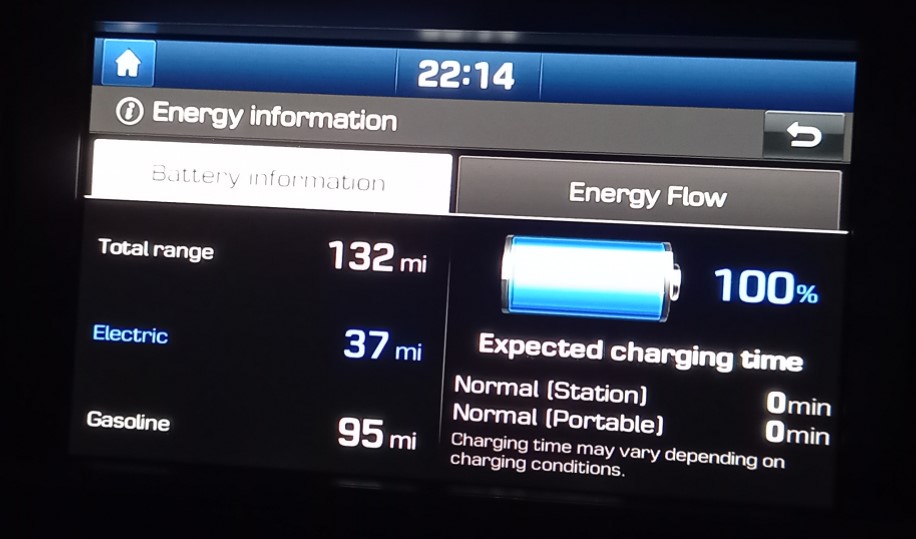
As can be seen, with the battery charged to 100%, an electric driving range of 37 miles is available. To calculate the available miles of range per kWh of battery power:
37 miles ÷ 8.9 kWh = 4.15 miles per kWh
In the above calculation, the vehicle can theoretically drive 4.15 miles per kWh. In real time
driving, as previously stated, the actual miles per kWh depends upon various other factors.
Gross and Net battery capacity
Another factor to be taken into consideration in respect of battery available power is the so-called gross kWh and net kWh battery capacity figures. The net kWh capacity of the high voltage battery defines the real time driving range of the vehicle.
Gross and net battery kWh capacity is defined as follows:
Gross Capacity
This is the total capacity, i.e. total amount of energy the battery pack can hold.
Net capacity (also referred to as useable capacity)
This is the amount of useable energy that the vehicle can draw from the battery pack to be able to move.
Not all vehicle manufacturers quote the net kWh of the high voltage battery.
The Hyundai Ioniq PHEV eventually uses up all of its electric driving range. In the image below, the vehicle’s energy information display now shows that the vehicle has zero miles of EV range.
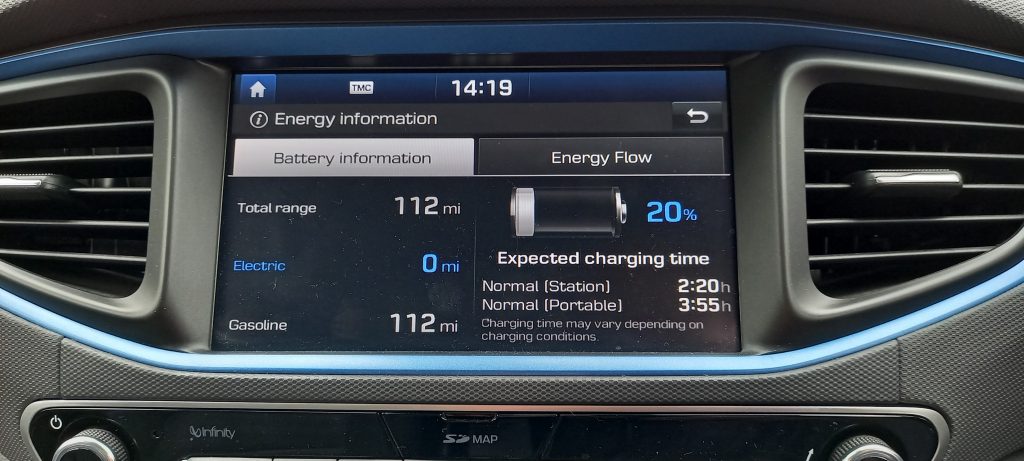
Note however that the display shows the battery state of charge is still 20% remaining. This means that only 80% of the high voltage battery’s capacity was used to supply the
vehicle’s 37 miles of EV driving range.
So whilst the gross power output rating of the vehicle’s high voltage battery is 8.9 kWh, its net useable output (80%) is in fact only 7.12 kWh. On the upside, this also means that the calculated available miles of driving range per kWh increases to 5.19 miles per kWh.
So, having looked at what the Ioniq PHEV can do, let’s do the maths to calculate the MPG equivalent.
A (UK) gallon of petrol contains approximately 43.95 kWh of energy.
The Ioniq’s high voltage battery has a useable 7.19 kWh of stored energy and can deliver up to 37 miles of EV driving range at around 5.19 miles per kWh.
The maths of it: 43.95 divided by 7.19 = 6.17
The Ioniq’s battery energy divides into the gallon of fuel’s energy 6.17 times. The miles per gallon equivalent is 6.17 x 37 miles = 228.29 miles.
So, the MPGe for my Ioniq PHEV is 228.29 miles per gallon.
But what about a full battery electric vehicle (BEV)
Ok, let’s look now at the full BEV variant of the Hyundai Ioniq with a 38.3 kWh high voltage battery (model year 2021 vehicle – note: NOT Ioniq 5). This first generation Ioniq has an advertised driving range of up to 193 miles on a full battery charge.
It is important to bear in mind that, whilst this driving range is shorter than that of a similar size petrol or diesel vehicle, the 193 miles quoted is based upon a high voltage battery kWh rating which is significantly less than a gallon of petrol.
According to US greencarreports.com website, the 2017 model year Hyundai Ioniq BEV has an EPA rating of 136 MPGe.
Summary and conclusion
When I developed my Electric & Hybrid Electric Vehicle Systems course throughout 2022, it was clear to me that the pace of technical developments in the electric and hybrid electric vehicle sector is occurring so rapidly as to surpass anything I have seen in my 38 years in the motor industry – the latest technology and vehicle specifications of today become out of date or taken for granted as ‘standard equipment’ in a very short space of time.
As technology stands in 2023, high voltage battery technologies are already evolving beyond lithium-ion. Who knows exactly where the technology will be by 2030. In the meantime, the two main challenges of high voltage battery driving range and the other consideration of battery charging times continue to be the focus of research and development in the evolution of electric and hybrid electric vehicles.
About AK Automotive
AK Automotive was established in 1999 by former Saab Master technician Tony Kitchen.
Tony is a PHEV owner / driver. He holds the IMI Level 4 Award in the Diagnosis, Testing & Repair of Electric / Hybrid Vehicles and Components. He is also an experienced, professionally qualified motor industry technical instructor and a qualified apprentice trained vehicle mechanic.
AK Automotive offer a two day on-site Electric & Hybrid Electric Vehicle Systems course for motor industry customers.
For further information, contact: Tony Kitchen (AK Automotive)
Telephone: 00 44 (0)7484 831 015
E-mail: tony@akautomotivetraining.co.uk

© AK Automotive 2023
Page last updated: Tuesday 20th June 2023
